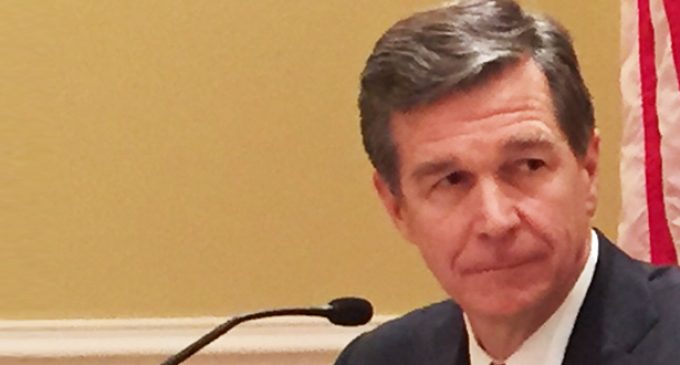Questions surround AG’s office

By Cash Michaels
For The Chronicle
The former FBI assistant director who reviewed the Winston-Salem Police investigation of Kalvin Michael Smith, ultimately calling it “one of the sloppiest …” he’d ever seen, says he does not understand why the state attorney general’s office does not move for a new trial, given the doubt cast on Smith’s guilt in a brutal 1995 assault.
Kalvin Smith, 44, has served 19 years of a possible 29-year sentence in prison for the crime. He maintains his innocence.
Meanwhile, student supporters of Smith with the Silk Plant Forest Truth Committee [SPFTC] are continuing to blast state Attorney General Roy Cooper for “… evading his prosecutorial responsibilities” by refusing to join Kalvin Smith’s legal defense counsel “… in petitioning the Superior Court to vacate the 1997 wrongful conviction ”
For its part, the state attorney general’s office says it, “… understands the community’s concerns and we want to work with them on systematic issues in the criminal justice system. But at this point in the legal process, only a court of law can overturn Kalvin Smith’s conviction and release him from prison.”
Again, supporters are asking Attorney General Cooper to join Smith’s defense in petitioning the court for a new trial to accomplish those very goals in the face of incontrovertible evidence that Smith was falsely convicted for a crime they say he did not commit.
The state attorney general’s office insists that, “… our office has a duty to represent the state in this particular matter …,” but supporters of Kalvin Smith counter that the duty of Attorney General Roy Cooper and his office is to seek the truth and justice, not uphold false convictions.
Chris Swecker, the man whose 2012 review of the Kalvin Smith case uncovered substantial evidence to cast serious doubt on Smith’s conviction, apparently agrees with the SPFTC.
Swecker had been with the Federal Bureau of Investigation as a special agent since June 1982, serving in field offices across the country, leading the Charlotte office, and even heading up FBI operations in Iraq. He is also credited with dismantling a Hezbollah terror cell in Charlotte, and capturing domestic terrorist Eric Robert Rudolph. In 2004, he was appointed assistant FBI director for the Criminal Investigative Division. Swecker retired from the FBI in July 2006.
In an interview with The Chronicle Sunday, the former FBI assistant director said he was retained by the SPFTC years ago to review the Winston-Salem police investigation into the brutal December 1995 beating of then 33-year-old Jill Marker, a manager at the now defunct Silk Plant Forest Shop off Silas Creek Parkway.
Ms. Marker had been beaten by an unknown assailant in the shop, sustaining serious brain trauma she is still being treated for today. Winston-Salem police initially suspected a white male with a history of domestic violence, but inexplicably dropped their probe of him, and instead arrested Kalvin Michael Smith, a black male who supporters say was nowhere near the Silk Plant Forest Shop the night of the assault.
Smith was convicted for the crime in 1997, even though Forsyth County prosecutors allegedly had exculpatory evidence they did not turn over at trial, Smith’s attorneys charge, in addition to “false evidence” and tainted testimony by investigators. The state attorney general’s office ultimately took over the case per the numerous appeals because of alleged conflicts of interest in the Forsyth district attorney’s office.
The case was reviewed by a Winston-Salem City Council committee and by Chris Swecker after he was hired by the SPFTC, with all coming to the same conclusion – the investigation that fingered Kalvin Smith for the crime was badly flawed.
“… [D]ue to the flawed nature of the original investigation, only a new trial that considers the full record and evidence not available, misrepresented or omitted in the original trial, will provide the full measure of justice that the community of Winston-Salem and every accused defendant deserves”
After 16 months, Swecker issued his report on the case in 2012. He knew the attorney general’s office well. He had been retained by it to do three separate reports, including one on shortcomings in the State Bureau of Investigation crime lab several years ago, which proved that evidence in several criminal cases had been mishandled. So he certainly had established professional contact with it.
Two weeks ago, Swecker says he was asked by email by a SPFTC official whether he had spoken with anyone in the state attorney general’s office about the report, and he replied, “Not that I recall.” SPFTC subsequently sent out a press release blasting Attorney General Cooper and his office for not discussing Swecker’s report with him.
Swecker then says he got a call from Julia White, chief of staff to Attorney General Cooper, reminding him of a telephone conversation they had “right after the report came out” in 2012. Swecker said he “had a lot of dealings with Julia White and she’s a person of integrity. If she says we spoke, I have to defer to her memory, because I spoke to a lot of people about the report after it came out and I don’t doubt that we had a conversation over the phone about it.”
Swecker says he has no “independent” memory of the call, nor does he have any notes to accurately portray it.
The SPFTC says it had sent the report to the attorney general’s office when it was issued, but couldn’t get anyone there to commit to formally meet with Swecker to discuss it in detail.
But here’s where Swecker and the state attorney general’s office’s versions diverge. Swecker told The Chronicle that if he did have a telephone conversation with Julia White of the attorney general’s office,
“ … it wasn’t a long one.”
Later in the conversation, Swecker added that “ I’d be surprised if it was longer than 15 minutes.”
Swecker also made clear that he’s had “… no in-person meetings” about the report with the attorney general’s office.
Noelle Talley, spokesperson for the N.C. Attorney General’s office, told The Chronicle last Friday that after his report came out in 2012, Chris Swecker “had a lengthy discussion with a senior advisor to the attorney general “ about it. She would not identify who that “senior advisor” was, nor could she pinpoint when the conversation took place.
Why the state attorney general’s office seems to insist that there’s nothing of note in the Swecker report worthy of consideration, but that they have done their due diligence in properly reviewing it, is a mystery not only to Kalvin Smith’s supporters, but to Chris Swecker as well.
“The report’s so detailed, and it speaks for itself that ….if [the AG’s Office] read the report … they should have read the report and dissected it … I still find it hard to believe that it wasn’t compelling enough for them to exercise their discretion that they have on appeal,” the former FBI director told The Chronicle Sunday, adding that, “I’m trying to stay both objective and neutral.”
Swecker noted that the attorney general’s office has previously exercised its legal discretion in several cases, including the infamous 2006 Duke lacrosse alleged rape case, and recently in the Charlotte fatal police shooting case.
“So I don’t buy that idea that they don’t have any discretion whatsoever on deciding whether to appeal or not to appeal, or oppose an appeal, for example,” he says.
Student supporters of Kalvin Smith from Wake Forest University, Winston-Salem State University and Salem College who have been rallying to have Smith freed, issued a statement this week which said, in part, “Attorney General Cooper cannot claim to be the courageous crusader for systemic criminal justice reform while continuing to defend the wrongful incarceration of Kalvin Michael Smith.
“We are calling on Mr. Cooper to uphold the oath of his office in seeking justice and truth: Justice for Kalvin, who has remained wrongfully incarcerated for 19 years, justice for Ms. Jill Marker, whose actual attacker has still not been held accountable, and justice for the citizens of North Carolina, whose tax dollars have paid to keep this innocent man in prison.”
















